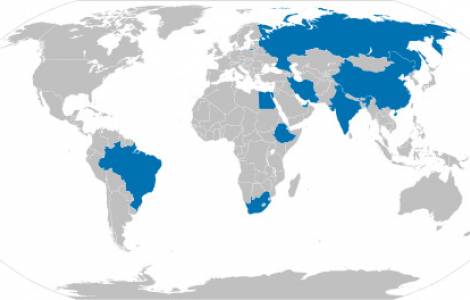
Wikipedia
by Cosimo Graziani
Kazan (Agenzia Fides) - The next BRICS Summit will take place from 22 to 24 October in the Russian city of Kazan.
The geopolitical and economic alliance known as BRICS takes its name from the initials of its original founding countries: Brazil, Russia, India and China joined in 2006, while South Africa joined in 2010.
Now the BRICS network is gradually expanding. Similar to last year's summit in South Africa, this time too there are a number of countries that want to join the group.
In Johannesburg, Ethiopia, the United Arab Emirates, Iran, Egypt and Saudi Arabia were admitted as new members.
This year Turkey, Azerbaijan and Malaysia, which have submitted formal applications for membership in recent weeks, could join. But the list of countries seeking to join or being courted by the current members is long: Thailand is very interested in joining, China is pushing for Kazakhstan to join, and Algeria is expected to join, which was due to join last year but was blocked by an Indian veto.
All the new countries applying to join have great geopolitical weight: Turkey and Azerbaijan are involved in the political changes in Europe and Asia, while Malaysia is a member of ASEAN, an organization that has been able in recent years to carve out an exceptional economic role for itself in a context such as the Indo-Pacific region, where the giants India and China are located.
Analysts say Turkey's application for membership is linked to its chances of gaining the desired accession to the European Union, a process in which negotiations have been stalled for about six years now. This reading is confirmed by comments made by Turkish Foreign Minister Hakan Fidan in a broadcast to Turkey's Anadolu Agency on Thursday, September 19. "If our economic integration into the European Union had been crowned with membership that went beyond the customs union, we might not be embarking on this kind of search on many issues," Fidan said.
For Azerbaijan, the accession would be the final recognition of its new status as a medium-sized power at the international level, as it would take place in the same year that Baku is organizing the Cop29 on the environment and thus can also influence the global agenda to combat climate change, despite being an oil-producing country.
Finally, Malaysia hopes to join the bloc to be able to act more freely in its trade relations: as explained on the website of The Diplomat magazine, Malaysia would use its membership to maintain political relations that are not too unbalanced with its trading partners, to ensure a fair distance with everyone, and to present itself as a "bridge" between this organization and ASEAN.
New members mean new international weight for the organization. But such an accelerated expansion of membership also raises doubts about the real benefits that members hope to gain. Up front, there is the problem of the procedures for admitting a new candidate. As seen in the case of Algeria last year, the weight of individual states in the final decisions is still enormous, and there are no defined criteria for admission.
Suffice it to say that Malaysia's application letter was sent to Russia and not to a special body, a sign that the decision will be strongly influenced by the interests and assessments of the country organizing the summit this year.
This hypothesis is confirmed by China's announcement last July that it would admit Kazakhstan to the organization: Beijing obviously did so because it has a strong interest in integrating Kazakhstan into the organization over the other members. This year, the acceptance of the candidacy of Turkey and Azerbaijan comes at a very convenient time for Russia, as it is involved in various issues in Europe and the Caucasus, and the acceptance of Malaysia is to be seen in a dialectical relationship with the Western world in terms of enlargement.
An enlargement that depends too much on the specific interests of the country organizing the summit risks making membership unbalanced in certain geographical contexts, quite unlike the "diffuse" and "balanced" enlargement that was clearly one of the selection criteria last year. This year, Eurasia is at the heart of the process, while the Indo-Pacific plays a secondary role and Africa, the Middle East and South America are left out. This would mean a reorientation towards these contexts next year, with the uncertainty that the respective relations between individual candidates and member states could slow down or block the process.
Such a dynamic affects the enlargement process, but also calls into question the very nature of the organization: what does BRICS want to be? An alternative to Western organizations or just an economic platform? One answer to this question seems to be the solution found with Algeria after last year's rejection: the country first joined the "New Development Bank" the BRICS banking institution, which also includes a South American country that has so far refused to join the bloc, such as Uruguay. Applying this solution of partial or reduced membership to other countries in the future would weaken the idea of BRICS as an alternative to the West and its international importance. (Agenzia Fides, 28/9/2024)